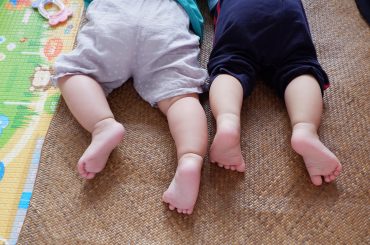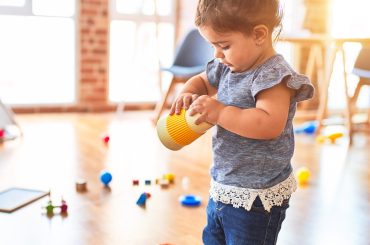 Babies begin to take their first steps around 12-15 months, but some may begin as early as 9 months. However, every baby develops at their own pace, so it is not uncommon for some babies to not begin walking until closer to 18 months.
Babies begin to take their first steps around 12-15 months, but some may begin as early as 9 months. However, every baby develops at their own pace, so it is not uncommon for some babies to not begin walking until closer to 18 months.
In this article, we will explore the development milestones of babies and the factors that can influence a baby’s ability to walk. We will also discuss the signs that parents should look out for to determine if their baby is ready to take their first steps and tips on how to encourage and support their development. Whether your baby is an early walker or a late bloomer, this article will provide valuable information for parents to understand the process of their baby’s development.
Contents
What are the Development Stages of Babies?
Babies go through several developmental stages during their first two years of life. These stages include:
- The newborn stage (birth to 2 months): During this stage, babies begin to develop their senses, including sight, hearing, taste, touch, and smell. They also begin to learn how to coordinate their movements and respond to their environment.
- The infant stage (2 to 12 months): During this stage, babies begin to develop their motor skills, such as sitting, crawling, and standing. They also start to develop language skills, such as cooing and babbling.
- The toddler stage (12 to 24 months): During this stage, babies begin to walk and run, and they continue to develop their language skills. They also start to develop their cognitive and social skills, such as problem-solving and interacting with others.
- The preschool stage (2 to 5 years): During this stage, children begin to develop more complex language skills, such as speaking in full sentences. They also start to develop their fine motor skills, such as using utensils and writing. They begin to develop their memory, imagination and creativity.
- The school-age stage (5 to 12 years): During this stage, children continue to develop their language and cognitive skills, as well as their physical abilities, such as coordination and balance. They start to develop their social and emotional skills, such as empathy and self-control.
 It is important to note that every child develops at their own pace, and these stages are not always clearly defined or occur in a linear fashion.
It is important to note that every child develops at their own pace, and these stages are not always clearly defined or occur in a linear fashion.
What are the Factors that can Influence Baby’s ability to Walk?
- Physical maturity: Some babies may be physically more mature than others, which can affect their ability to walk. For example, a baby with strong leg muscles may be able to stand and take steps earlier than a baby with weaker leg muscles.
- Health and nutrition: Babies who are healthy and well-nourished are more likely to develop the physical and cognitive abilities needed to walk.
- Environmental factors: The environment in which a baby is raised can also affect their ability to walk. For example, a baby who has ample space to move and explore will have more opportunities to practice walking than a baby who is confined to a small area.
- Genetics: A baby’s genetics can also play a role in their ability to walk. Studies have shown that there is a genetic component to the age at which a baby begins to walk.
- Developmental conditions: Some babies may have developmental conditions that affect their ability to walk, such as cerebral palsy or Down syndrome.
- Parental involvement: Parental involvement in a baby’s development can also play a role in their ability to walk. Parents who encourage their babies to explore and practice moving around, such as by providing toys that encourage crawling, can help their babies develop the skills needed to walk.
 Tips on How to Encourage and Support their Development
Tips on How to Encourage and Support their Development
- Provide opportunities for exploration: Give your baby plenty of space to move and explore, such as by providing a safe play area with toys that encourage crawling and standing.
- Encourage physical activity: Help your baby develop their physical abilities by encouraging them to move and play, such as by playing games that involve crawling or walking.
- Provide support: As your baby begins to take their first steps, provide support by holding their hands or placing your hands behind their back to help them balance.
- Practice patience: Every baby develops at their own pace, so it’s important to be patient and not rush your baby into walking.
- Read, sing and talk to your baby: Reading, singing, and talking to your baby can help develop their language skills, which can aid in their development.
- Be present: Spend time with your baby, playing, and interacting with them; this can help in building a strong bond and also helps in monitoring their development.
- Consult a pediatrician: If you have any concerns about your baby’s development, it is best to consult a pediatrician. They can check for potential problems and advise on how to support your baby’s development.
Conclusion
In conclusion, babies go through several developmental stages during their first two years of life, including the newborn stage, the infant stage, the toddler stage, the preschool stage and the school-age stage. Walking is an important milestone that typically occurs during the toddler stage, between 12-15 months.
However, there are several factors that can influence a baby’s ability to walk, including physical maturity, health and nutrition, environmental factors, genetics and developmental conditions. Parents can encourage and support their baby’s development by providing opportunities for exploration, encouraging physical activity, providing support, practicing patience, reading, singing and talking to the baby, being present and consulting a pediatrician if they have any concerns. Every baby is unique and develops at their own pace, so it’s important to be patient and supportive as they learn to walk.
Want to know about 5 Free Parental Control apps? Read it here.





